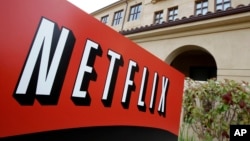Netflix's decision expand to Cuba is unlikely to turn a profit for the company anytime soon and may have been premature, analysts say.
The streaming U.S. video service said last month that it would launch service in Cuba. The news followed a decision by Washington and Havana to restore diplomatic relations after nearly half a century.
Netflix is entering a market where few Cubans have high speed Internet connections or enough money to afford the service.
Peter Hakim, the president emeritus of the Dialogue, a Washington-based research organization for Western hemisphere affairs, said Netflix is taking a risk by betting on the future of the Caribbean island.
“Anybody who goes to Cuba now is taking something of a gamble," he said. "But it is better to be first."
He said the cost of making the gamble is not very high for Netflix.
"They depend on the services of a lot of other people," he said. "And I think they’re betting there’s enough services there to make some money, and that they’ll be there when more services are added.”
Missing the point
Kirby Jones, the founder of U.S.-Cuba Trade Association, said the launch is premature.
“It’s not a question of ‘when profitable,’ it’s a question of when can they start operations," he said. "You’re missing the point. And many American companies are missing the point."
It takes two parties to do business, Jones said.
"Just because companies from the United States want to do business, it doesn’t mean they can do business," he said. "They have to have cooperation from Cubans, and there has to have regulations on the U.S. side."
Jones said that there is no mechanism to allow Netflix to do business because there is no direct banking relationship between Cuba and the United States. He said there have to be regulations on the U.S. side that would allow Netflix to operate.
Until these regulations are dealt with, he said there will be no business.
But Hakim said that there is an existing market in the Cuban tourist industry, which draws visitors from Europe and Canada, that Netflix can draw on. He said that sector will grow.
"Those tourists are going to be going to hotels, rooming houses, hostels, people’s private homes, and the extent to which Cuba, which does not have a what you might call 'a top of the line' access to television material to have access to Netflix would certainly be an advantage to any hotel,” he said.
Side affects
Hakim said that Netflix could have a potential positive side effect on communication technology in Cuba.
“It’s not only installing, improving, creating access to the Internet, not merely as a commercial initiative. It’s a pro-democracy initiative. It’s pro-freedom of information, freedom of access in exercise," he said.
"That may not interest Netflix immediately," he said, "but they are betting, I think, that in fact, Cuba will begin to get a serious Internet capability, maybe not in the next two years, but certainly in the next four or five years.”
Since the announcement of restoring ties with Cuba, President Obama has eased some sanctions against the country, opening up the island to expanded U.S. travel and economic activities. But other U.S. sanctions on Cuba will require Congressional action to lift.
Netflix streams thousands of moves and TV shows to 57 million customers in the United States and nearly 50 other countries.




